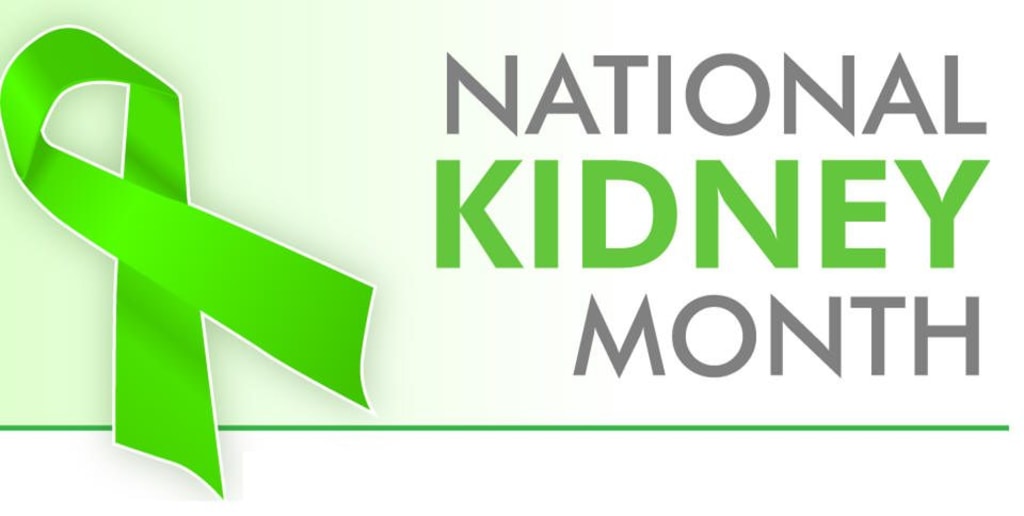
Since it’s National Kidney Awareness month, I thought it’d be a good idea to share my family’s story with kidney disease in hopes that it’ll not only raise awareness, but let others who are suffering from this disease know they aren’t alone.
Eight years ago, my father was diagnosed with end stage renal disease. Kidney disease can be a tricky thing because 90 percent of kidney function can be lost before you start showing signs that your kidneys are shutting down. For my dad, he started getting darker, sleeping more, and vomiting to the point of dry heaving. We chalked his signs of getting darker and sleeping more on his work ethics. Before he got sick, he was working outside in the sun for over 30 years. When he finally got his symptoms checked out, it was too late. His kidneys were only functioning at three percent and he had to be put on dialysis immediately. His high blood pressure had damaged them.
Unfortunately, there is no cure for kidney disease. There are only two treatments, dialysis or a kidney transplant. In the United States, nearly 100,000 people are in need of a kidney. Healthy people who have two kidneys can change this by becoming a living donor. If you don’t suffer from kidney issues, you can live a perfectly normal life with only one. A lot of people don’t know this, but hemodialysis patients have to spend 12 hours per week on a machine, which takes the place of what the kidneys are supposed to do.
After all of this information, you’re probably wondering, "How can I learn more about kidneys and kidney disease in the wake of National Kidney Awareness month?" Well, look no further.
Here are my top ten tips you must know in order to educate yourself for National Kidney Awareness month:
- Too much sodium is harmful to the kidneys: Because high blood pressure is one of the main reasons your kidneys are affected, limiting your sodium intake is key to protecting your kidneys. Although kidney disease doesn’t affect me directly (in the sense that I don’t have kidney disease), I’m constantly reading the nutrition labels to watch my sodium intake.
- There are five stages of kidney disease: Just because there are five stages of kidney disease, doesn’t necessarily mean they are all bad. Stage one kidney disease is when you have normal function of your kidneys. However, stage five is less than 15 percent, which means that you have kidney failure.
- Diabetes, high blood pressure, and heart disease are risk factors for kidney disease: This means that if you suffer from either of these illnesses, the chances that you will develop kidney disease is even higher.
- Kidney disease increases the chance of developing heart disease: I can attest to this. A couple of years ago, my father suffered a heart attack, and had to not only get stents put in, but he also had to have a triple bypass. Because he’d been only dialysis for a while, it had calcified his veins, which made it impossible to do stents on both sides, which was why he had to have the bypass done.
- Drinking water helps keeps your kidneys healthy: This tip is tricky. If you aren’t on dialysis, water is key to ensuring your kidneys are on the right track of healthiness. However, if you’re on dialysis, especially hemodialysis, you must watch your fluid intake. This doesn’t just go for water; this is also sodas, popsicles, ice, and gravies…A lot of things we consume breaks down to fluid, including sodium.
- Pain medicines, such as NSAIDs, can be harmful to the kidneys: Aleve was the kicker for my dad. When we first learned that his kidneys were at 75 percent, the doctors encouraged him to step away from medications such as Aleve. Now, he’s only allowed to take Tylenol, because any other pain medicine can be damaging to his kidneys.
- Anyone can be affected by kidney disease: It doesn’t matter if you’re black, white, Mexican, young, teenage, or old. Kidney disease can affect anyone.
- Two tests are all it takes: How can you figure out the functioning of your kidneys and whether you are at risk for kidney disease? There are two simple tests you can get done at your doctor’s office: urine and blood. It’s that simple.
- Kidney disease usually affects both kidneys: Although kidney disease affects both kidneys, if you have healthy kidneys, you can live with just one.
- If your kidneys stop working, you WILL need dialysis or a kidney transplant to stay alive: There is no other way. However, dialysis and transplants are only treatments. Neither of these options are cures for kidney disease because there is no cure.
The best way to fight kidney disease is to get educated, learn the signs and symptoms, and get the necessary help. Early detection is key.





Comments
There are no comments for this story
Be the first to respond and start the conversation.